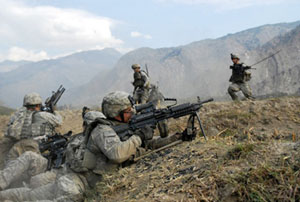(lead article)
White House plans for
Afghan war escalation
Mulls sending 30,000 or more troops

|
|
U.S. Army/Sgt. Matthew Moeller
|
|
U.S. Army soldiers November 3 take cover in heavy firefight with Taliban forces at Waterpur Valley in Kunar province, Afghanistan.
|
BY SAM MANUEL
While denying that any decision has been made, White House officials say that President Barack Obama will likely approve sending tens of thousands additional troops to Afghanistan.
Civilian deaths in the eight-year-old war continue to mount. Nine civilians, including at least three children, were killed in a NATO rocket strike November 5, reported Associated Press.
The Obama administration has not been helped by the outcome of the presidential election in Afghanistan, which Washington hoped would establish a more credible regime in Kabul. It was instead rife with charges of election fraud and the main challenger, Abdullah Abdullah, dropped out of a planned runoff.
According to Associated Press, White House officials said that the deployment of additional troops to Afghanistan would most likely begin in January, aimed at strengthening their presence in 10 key cities and towns. Washington's top general in Afghanistan, Stanley McChrystal, submitted an assessment of war strategy there calling for an additional 40,000 troops.
White House officials have said the increase in troops is all but inevitable, reported AP. Gen. George Casey, the army's chief of staff, added his voice November 8 to those high-ranking military officials calling for sending more troops. Speaking on NBC's "Meet the Press," Casey said, "I believe that we need to put additional forces into Afghanistan to give General McChrystal the ability to both dampen the successes of the Taliban while we train the Afghan civilian forces."
McChrystal's new counterinsurgency strategy in Afghanistan stresses the need to reduce civilian deaths. The strategy draws on lessons of the Bush administration's successes in Iraq. But civilian deaths continue to rise from NATO air strikes and artillery fire.
The November 5 rocket strike hit Korkhashien village in Helmand Province. Residents of the village drove the bodies of those killed to the governor's office. Afghan local officials had denied knowledge of any civilian deaths, reported the Miami Herald. Helmand has been at the center of the stiffest fighting and highest casualties from the U.S.-led intervention.
NATO said those killed by the rocket were suspected of planting a bomb. NATO spokeswoman Navy Capt. Jane Campbell said the alliance "takes all credible allegations of civilian casualties very seriously and investigates each allegation to determine the facts. If any civilians were injured through our actions, we deeply regret it."
A resident of the village told AP that the nine people were killed while harvesting corn in their fields.
President Hamid Karzai condemned what his statement called an "attack on civilians." One day after being declared officially the winner of Afghanistan’s presidential election, Karzai said he wants to have an "inclusive government." The U.S. government has pressed Karzai to institute reforms and to reach an accommodation with Abdullah. Obama called for a "new chapter" in the Afghan government.
British prime minister Gordon Brown said Karzai has to make it clear that corruption in the government will end. He also reiterated the British government's continued commitment to the war. "If we are to defend Britain properly from this terrorist threat, then it is not enough simply to defend ourselves here. We have got to make sure that we diminish the effect of those people who are planning terrorist activities on the Afghan-Pakistan border," Brown said.
Opposition to Britain's involvement in the war continues to mount, including in ruling-class circles. On November 3 Kim Howells, former foreign office minister in Brown's government, called for a phased withdrawal of British troops from Helmand while stepping up surveillance of Muslim communities in the United Kingdom. Howells is now the government's watchdog for intelligence and security.
| 


